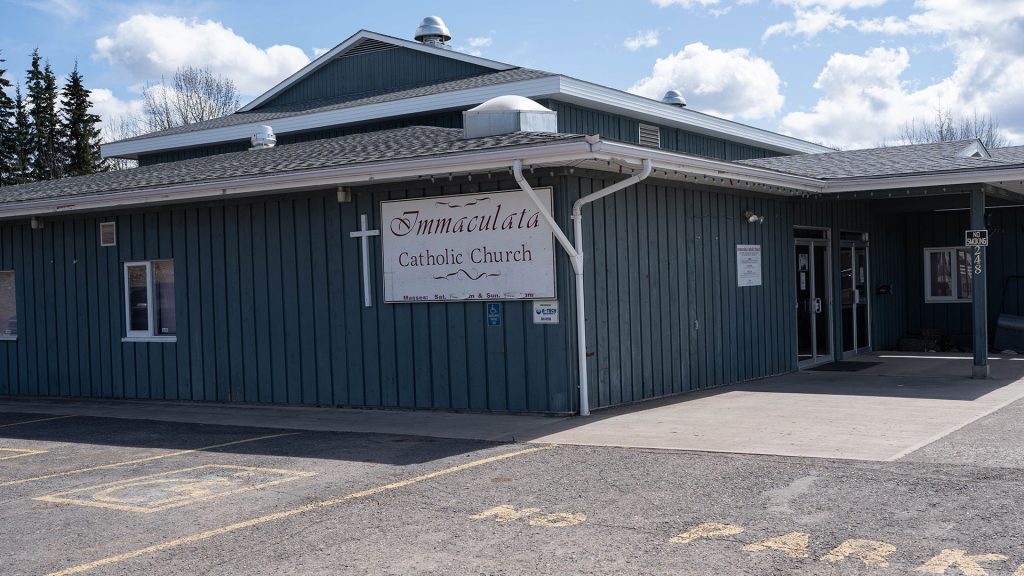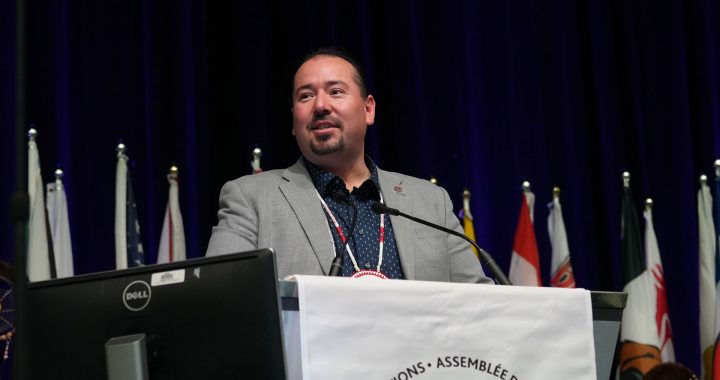
Former Immaculata Day School in Burns Lake, B.C. Photo: APTN file
This story mentions experiences of day school abuse. First Nations, Inuit and Métis seeking immediate emotional support can contact the Hope for Wellness Help Line toll-free at 1-855-242-3310, or by online chat at hopeforwellness.ca.
Dorothy Williams says she preferred to break her silence about the abuse she suffered 50 years ago at Immaculata Day School to a reporter instead of the police.
“I was too scared (to tell the RCMP),” she testified at a Canadian Human Rights Tribunal in Burns Lake, B.C., Monday.
“Their intimidation, their mannerisms towards Natives. I felt that they were racist toward us, (that) they didn’t want to listen to us.”
It was a belief that would repeat itself in the form of a discrimination complaint Williams joined against the RCMP in 2017.
That’s when she and five other survivors filed a complaint with the Canadian Human Rights Commission about the way Prince George RCMP handled their 2012 allegations of historical physical abuse against a former teacher.
READ MORE: Canadian Human Rights Tribunal to hear about historical day school abuse in Burns Lake, B.C.
The teacher, who worked at schools in northern B.C. in the 1960s and ‘70s, can only be referred to as A.B., according to publication bans granted by the tribunal and Federal Court in 2022.
The survivors alleged the RCMP did not find sufficient evidence to warrant criminal charges due to a half-hearted investigation that discriminated against them and favoured A.B.
The RCMP’s “traditional investigative methods fail to meet the needs of Indigenous victims…and are executed with biased attitudes,” they said in their complaint.
They also claim the RCMP closed the case in 2013 without informing them.
The RCMP have rejected the survivors’ claims.
Public hearing
After its own year-long investigation in 2018, the commission asked the tribunal in 2020 to hold a public hearing into the way the RCMP conducted the case.
“This complaint involves serious allegations of failure to investigate historical sexual abuse, racism, and conflict of interests,” the commission said in its decision obtained by APTN News.
The commission noted the RCMP tried to stop the hearing, arguing it would be “prejudiced” by the passage of time because “memories have faded and notes taken at the time do not necessarily still exist.”
The commission declared that argument “misleading and speculative.”
Legal wrangling
The COVID-19 pandemic and legal wrangling delayed the hearing until now during which time three survivors and one witness have died.
Williams said she and her sister, Emma Williams, who succumbed to complications from COVID-19 in 2021, were forced to attend the school starting in Kindergarten. She said her family from Lake Babine First Nation had to move into the village of Burns Lake.
She told tribunal Member Colleen Harrington she and Emma were emotionally and physically abused but never discussed it until much later in their lives – not even with their parents, who were Catholic.
In 2012, the pair decided to share their traumatic experiences with Ontario-based journalist Laura Robinson – a non-Indigenous woman Dorothy said Emma trusted.
While telling their stories to Robinson, Dorothy said Emma told her what happened in the boiler room of the Catholic-run school.
‘Tied overhead’
“Her arms were crossed and tied overhead” to a pole while “she felt the abuser’s hands all over her body; all she felt was pain,” Dorothy testified.
“And then when it was my turn I blacked out…She recalled me being sexually abused.”
Dorothy identified a priest as the abuser, but said the teacher and nun who “dragged” them to the room were also to blame.
“I don’t want money,” she explained as lawyers for the RCMP and A.B. listened and took notes.
“Do I want a public apology? Maybe.”
‘The basketball’
Under questioning from the survivors’ lawyer, Karen Bellehumeur of Ontario, Dorothy recounted A.B. being “abrupt, mean” and striking her in the head “with the basketball or whatever ball he had…
“If the force of the ball didn’t knock me over (he) would say, ‘Oh, I didn’t hit you hard enough. I’ll have to hit you again.’”
Dorothy said she became afraid of A.B. – even hiding from him at times – after she said he used racist language, criticized her family’s diet, and suggested she bathe.
“At the time it was hush hush,” she said of the abuse. “We didn’t know what was happening to us.”
Jonathan Bujeau, a lawyer for the human rights commission, wondered whether Dorothy was contacted by the RCMP as part of their investigation. She said No.
The tribunal is expected to hear 10 weeks of testimony, with two weeks (May 1-5 and May 8-12) scheduled in Burns Lake, a village about a 21/2-hour drive west of Prince George.
The tribunal agreed to travel to northern B.C. to hear the survivors’ evidence near their home nations of Lake Babine and Burns Lake so they could be supported and heard by their communities.










